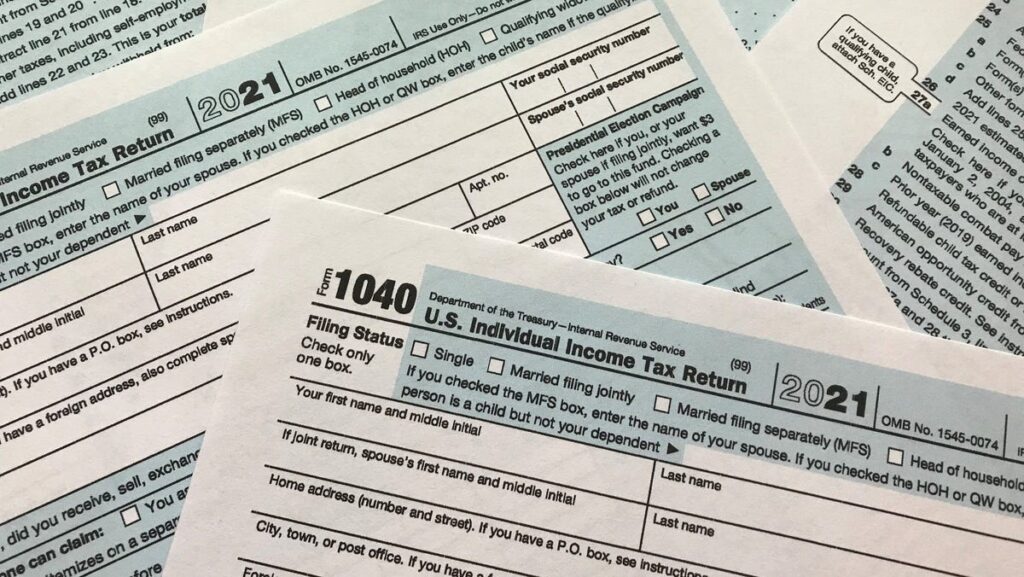Many Americans hesitant to file taxes amid IRS workforce cuts, survey finds
Think fewer IRS agents means you won’t get audited? Experts say think again.
Scripps News
Are you eligible for a $1,400 payment? Some Americans are running out of time to claim it.
The Internal Revenue Service announced in December it would be distributing about $2.4 billion − up to $1,400 per individual − worth of payments to eligible U.S. taxpayers who did not claim the Recovery Rebate Credit on their 2021 tax returns.
According to the IRS, this round of payments was established after the agency reviewed internal data showing that many eligible taxpayers who filed a 2021 tax return did not claim the Recovery Rebate Credit, a refundable credit for individuals who didn’t receive one or more Economic Impact Payments, more commonly known as stimulus payments.
Here’s what to know about whether you are eligible for the payment with the deadline just a few days away on April 15.
Who is eligible for the Recovery Rebate Credit?
The Recovery Rebate Credit was created for individuals who did not receive one or more stimulus checks during the COVID-19 pandemic, also known as Economic Impact Payments, the IRS said.
Beginning in December 2024, the IRS has been issuing special payments to those who were eligible for a Recovery Rebate Credit but did not claim it on their 2021 tax return.
Those who did not receive the full amount of the third stimulus check, which was sent in March 2021, may be eligible for the Recovery Rebate Credit on their 2021 tax return, the IRS has said. If you’re wondering about the first two stimulus checks (which were sent in March 2020 and December 2020), the agency has previously urged taxpayers not to include information about those checks, nor the 2020 Recovery Rebate Credit, on their 2021 tax returns.
Americans who were eligible to claim the credit but did not file their 2021 tax return can still receive the payment, but only if they file their 2021 return by April 15, 2025.
Eligible taxpayers who filed their 2021 tax returns but did not claim the Recovery Rebate Credit are also eligible, but these taxpayers should have automatically received their payments in December 2024 or January 2025 without taking any action, according to the IRS.
Taxpayers can check if they claimed this credit by looking at their 2021 tax return and checking if they left the Recovery Rebate Credit field blank or filled it out as $0.
To see which stimulus checks, or Economic Impact Payments (EIP), you may have received, the IRS encourages you to sign in to your online account and check the “Economic Impact Payment Information” section on the “Tax Records” page.
According to the IRS, more than 1 million taxpayers in the U.S. didn’t claim the Recovery Rebate Credit on their 2021 tax return despite being eligible.
Who does the April 15 deadline pertain to?
Individuals who are eligible for the Recovery Rebate Credit but have not yet filed a 2021 tax return have until April 15, 2025 to file and receive the payment. (April 15, 2025 is also the deadline to file your 2024 tax returns.)
Eligible individuals must file a tax return to claim a Recovery Rebate Credit, even if their income from a job, business or other source was minimal or non-existent, according to the IRS.
How do taxpayers claim the payment up to $1,400?
The IRS said payments would automatically be sent out beginning in December 2024, and continuing through late January 2025.
The IRS said eligible taxpayers would receive a letter notifying them of the payment, and the payments will either be automatically direct deposited or sent by paper check.
Taxpayers who did not file a 2021 tax return may still be eligible for the check if they file their return and claim the Recovery Rebate Credit by April 15.
How much money will taxpayers receive?
An eligible taxpayer may receive up to $1,400, according to the IRS.
The stimulus amount is dependent on your adjusted gross income. In order to qualify for the full $1,400, the taxpayers’ annual income must not have been more than $75,000 for single filers or $150,000 for married couples filing jointly.
Contributing: Maria Francis, USA TODAY Network
Gabe Hauari is a national trending news reporter at USA TODAY. You can follow him on X @GabeHauari or email him at Gdhauari@gannett.com.
Greta Cross is a national trending reporter at USA TODAY. Follow her on X and Instagram @gretalcross. Story idea? Email her at gcross@usatoday.com.
